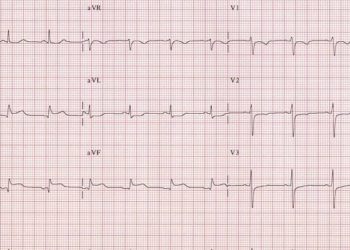Olezarsen effectively decreases triglyceride levels
1. In this randomized controlled trial, in patients with hypertriglyceridemia and elevated cardiovascular risk or severe hypertriglyceridemia, olezarsen had reduced triglyceride levels compared to placebo.
2. The olezarsen groups had lower levels of APOC3, apolipoprotein B, and non-HDL cholesterol than the placebo group.
Evidence Rating Level: 1 (Excellent)
Study Rundown: The proportion of patients with high levels of triglycerides and triglyceride-rich lipoproteins is rising in the general population. Higher levels of triglycerides have been associated with an elevated cardiovascular risk, along with other clinical consequences. One possible intervention is olezarsen, an antisense oligonucleotide that targets apolipoprotein C-III (APOC3) mRNA. To investigate the efficacy and safety of olezarsen in reducing triglyceride levels, a phase 2b randomized control trial recruited adults with moderate hypertriglyceridemia and elevated cardiovascular risk or severe hypertriglyceridemia to participate. These individuals were randomly assigned in a 1:1 ratio to either receive 50 or 80 mg of olezarsen and then transferred in a 3:1 ratio within each cohort to receive monthly olezarsen subcutaneously or placebo. The percent change in triglyceride level between baseline and six months was evaluated as the primary outcome. Secondary outcomes included lipid levels such as APOC3, cholesterol, and LDL-cholesterol changes. The study only evaluated efficacy for up to one year, thus limiting the generalizability of the results. Overall, compared to the placebo group, a dose of 50 mg or 80 mg was effective at lowering the triglyceride levels in patients with moderate hypertriglyceridemia with elevated cardiovascular risk.
Click here to read the study in the NEJM
In-Depth [randomized controlled trial]: This randomized control trial recruited patients from the United States and Canada to either receive 50 mg of olezarsen (58 patients), 80 mg of olezarsen (58 patients), or placebo (39 patients) once monthly. Individuals 18 years or older were eligible to participate if they had moderate hypertriglyceridemia plus elevated cardiovascular risk or severe hypertriglyceridemia. Patients were excluded if they had poorly controlled diabetes or other comorbidities such as a recent acute coronary syndrome. Several patients prematurely discontinued the use of the drug or placebo, including 14 of 58 (24%) in the 50 mg of olezarsen group, 7 of 57 patients (12%) in the 80 mg olezarsen group, and 3 of 39 patients (8%) in the placebo group. Triglyceride levels were significantly reduced in both groups that received the olezarsen compared with the group receiving the placebo. When comparing the amount the triglycerides decreased, the placebo group patients had a mean decrease of 7.8% (95% confidence interval [CI], 0.2 to 15.3). In contrast, the 50 mg olezarsen group decreased 57.1% (95% CI, 50.9 to 63.2), and the 80 mg group had a mean decrease of 60.9% (95% CI, 54.7 to 67.1). Thus, there was an absolute difference of 49.3 percentage points (95% CI, 39.5 to 59.0) and 53.1 percentage points (95% CI, 43.4 to 62.9) for the 50 mg and 80 mg olezarsen groups, respectively, when compared to the placebo group (P<0.001 for both comparisons). The two groups that received olezarsen also had reduced levels of APOC3, apolipoprotein B, and non-HDL cholesterol compared to the placebo group. All three groups had comparable risk levels of serious and serious adverse events. In summary, olezarsen was associated with improved triglyceride levels in a high-risk population for cardiovascular disease.
Image: PD
©2024 2 Minute Medicine, Inc. All rights reserved. No works may be reproduced without expressed written consent from 2 Minute Medicine, Inc. Inquire about licensing here. No article should be construed as medical advice and is not intended as such by the authors or by 2 Minute Medicine, Inc.






![Macitentan better than placebo for preventing progression of pulmonary arterial hypertension [SERAPHIN Trial]](https://www.2minutemedicine.com/wp-content/uploads/2013/08/ca68dc0329bef0b42ccae7b6656a0f_gallery-75x75.jpg)

